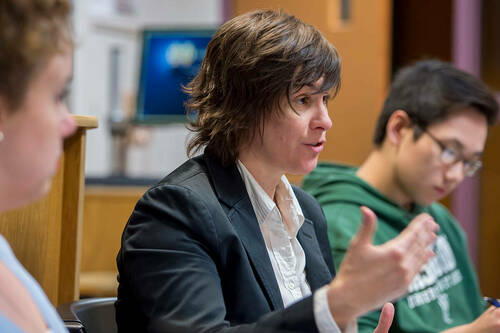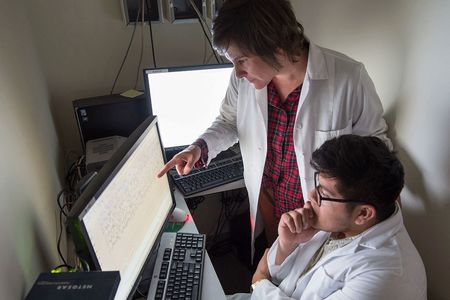
Psychologist Jessica Payne is passionate about helping the world better understand the value of sleep — and the many ways it impacts our cognition, health and longevity.
She dreams of a society in which people no longer take pride in how little sleep they need to get by, but how much they sleep in order to thrive.
“It’s mystifying to me that there is still such a cultural disconnect between the science and our social reality,” Payne, associate professor of psychology at the University of Notre Dame, said. “There is so much negative messaging and downright mythology about sleep. There’s this idea that if you’re only committed enough to your job or strong enough as a person, you’ll sleep less because it’s a waste of time. But science shows us the opposite is true.
“I want to use science to convince students, individuals and organizations that it’s not only permitted but expected that if you get tired in the middle of the day, you put your head down and take a short, 20-minute or less nap.”
Payne’s groundbreaking research on the relationship between sleep, stress and psychological function has led to her being selected as the National Academy of Sciences 2021 Seymour Benzer/Sydney Brenner Lecturer. She is slated to give the public lecture on her research in Irvine, California, this spring.
“For me, this is more than just a personal honor — I am also encouraged that the National Academy is paying attention to sleep because sleep neuroscience and sleep science have not been given the respect they’re due for so long,” she said. “I’m very excited to be part of this initiative where I can talk to the public and the scientific community.”
Payne has also recently been awarded a nearly $900,000 grant from the National Science Foundation for her project “Sleep and Selective Emotional Memory Consolidation from Young Adulthood through Middle Age.”
In the four-year study, Payne and her colleagues will examine the relationship between sleep and memory in middle-aged adults — a demographic that is particularly understudied, she said.
“There are a lot of sleep issues that start to emerge in middle age, and at the same time, memory complaints start to emerge,” Payne said. “It seems obvious to me to look for a connection. It’s possible that our sleep architecture changes and the reduced quality or quantity of our sleep is having an impact on our cognitive abilities. If we can improve sleep quality, we may be able to improve cognition and memory as well.”
An active state
Sleep is not just a biological necessity, but a very active state for our brains, Payne said.
“And it’s an active state in the specific brain regions associated with things we all care about, like learning, memory, decision-making, creativity and stress regulation,” she said.
There is growing evidence that one purpose of sleep is to strengthen memories formed during the day, particularly if they are emotionally salient. However, the majority of this evidence stems from college-age research participants and may not be generalizable to the broader population.
The same commitments and responsibilities that have traditionally made it more difficult for middle-aged adults to participate in research studies may also be the culprits behind their sleep deficits, she said.
“I feel like middle age is a time when our habits change because the pressures we are under are immense — working, caring for children and sometimes aging parents — and it’s a lot to balance,” she said. “So it’s not surprising to me, given the connection between stress and sleep, that we see sleep problems or deficiencies develop at this point.”
Those problems not only affect quality of life for middle-age adults, but may also affect how they age, cognitively and neurologically.
“I’m very interested in how the things we’re doing now — for good or for bad — impact the way we ultimately age,” she said. “I think we all really hope we can flourish in old age, not just live a long time, but have quality of life. And there’s a lot of preliminary evidence that sleep is critical for that.”
Building on this project, Payne also hopes to conduct a longitudinal study in the future on how stressors and sleep quality in middle age influence cognitive functioning.
Memory reactivation

Payne and her research team are also launching a study on targeted memory reactivation. It is established that pairing a learning event with a scent or a tone can help a participant to recall the information when the cue is reintroduced. But she has also found that reintroducing the cue at a very low level while the participant is in a deep stage of sleep reactivates the memory as well.
“Sleep already helps with memory, but if you reapply a memory cue during sleep, it’s actually even better,” she said. “This has clear, practical implications for improving our ability to learn or potentially stave off age-related memory decline.”
Payne’s newest study takes that concept a step further to explore ways to deepen and improve sleep for people suffering from depression or anxiety disorders by using the same strategy to help them learn and, ultimately, reactivate relaxation techniques.
“We know that stress and anxiety, and all their concomitant mental health issues, are associated with poor-quality, fractured and fragmented sleep,” she said. “We’re training people in meditative relaxation techniques, paired with certain tones, and then we’ll be replaying those tones during sleep. We’re predicting and hoping to see positive changes in their sleep architecture and measures of well-being.”
The relaxation study is particularly promising, she said, because it targets two parts of participants’ systems that are struggling at the same time, and could help reverse the “sleep-stress spiral,” as Payne calls it, often associated with these disorders.
“These exercises have been shown to be helpful for reducing stress hormones and physiology during the day,” she said. “Reactivating that relaxation state during sleep could suppress the stress we think is causing sleep disruptions. If you can both reduce stress and improve sleep, we would expect to see much better psychological outcomes.”
Improving lives
The University has been incredibly supportive of her research, Payne said, through the building of a state-of-the-art sleep lab as part of the Corbett Family Hall project and the project funding she’s received through the Institute for Scholarship in the Liberal Arts.
She also sees a natural fit between her research and the Notre Dame mission.
“I am very concerned about the science of sleep and stress and their impacts on the brain,” she said. “But I’m especially interested in applying these findings to improve the quality of people’s lives — and that is very consistent with the University’s mission.
“We’re really excited to improve human flourishing by treating this very overlooked phenomenon that just happens to take up one-third of your life. We should be focused on how to improve it and treat it when it goes awry, whether that’s through the aging process or clinical issues.”
Originally published by at al.nd.edu on Feb. 3.